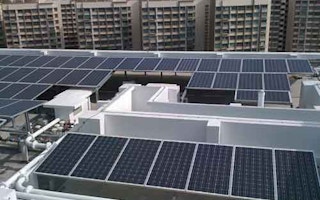Business is heating up for a little-known company in Singapore’s fledgling solar sector.
Barely days after scoring a Housing Board (HDB) contract to install and operate an $11 million solar system for 45 residential blocks in Punggol under a leasing model, local solar product manufacturer Sunseap Enterprises has inked a similar leasing deal with sushi group Sakae Holdings.
It is the first contract for Sunseap under its solar-leasing programme for commercial buildings, which it launched last week, its director Frank Phuan told The Straits Times.
Under a 20-year lease agreement, Sunseap will install 1,400 solar panels for a 270 kilowatt-peak solar system – which will generate more than 300,000 kilowatt hours of power annually – on the roof of Sakae’s Tai Seng Building in Upper Paya Lebar. A watt peak is a measure of power output used in relation to photovoltaic solar-energy devices.
Sakae will pay a small portion of the upfront costs and buy the solar energy at a rate not higher than the current electricity tariff for the next 20 years.
Mr Phuan declined to disclose the upfront amount but estimated the total cost of the solar system at $1.2 million. It will be installed by year-end.
This deal comes swiftly after Sunseap signed a contract on Thursday with the HDB to design, install and maintain a 2 MWp (megawatt peak) solar photovoltaic system. It will power common area facilities such as corridor lights and lifts in the 45 blocks. The Pasir Ris-Punggol Town Council will take out a 20-year lease and buy the power priced at the current tariff, with a 1 per cent discount thrown in. In this case, as the project is a test-bed, HDB said it will cover 30 per cent of the cost, or $3.28 million, while Sunseap will foot the rest.
Mr Phuan said the leasing model could be a turning point for the industry locally as it has the potential to spur widespread adoption of solar energy systems. This comes as firms are increasingly aware of corporate social responsibility (CSR) and are under pressure to do their bit for the environment.
Sakae Holdings executive vice-president Lilian Foo said the firm was proud to be involved in Singapore’s first commercial solar-leasing project. She said as CSR is a cornerstone of the firm’s values, going green is a natural progression. Under this scheme, it does not have to foot high upfront costs yet is able to buy cheaper, green power, she said.
Although popular in countries such as the United States, the leasing concept is relatively new in Asia.
Mr Phuan said the benefits are clear and the programme allows clients to lock in competitive rates for electricity over the course of the lease period.
Sunseap is in talks with property developers and will be setting up an office in China’s Tianjin province to market its leasing programme to the Sino- Singapore Tianjin Eco-City, which has a mandate to get 20 per cent of its energy from renewables. The eco-city being built is a 50-50 tie-up between the two countries.
Mr Phuan, 35, grew up in the solar business as his father owned a company set up in 1978 that made solar systems. About 11 years ago, the duo set up Sunseap, which now has an annual revenue of about $10 million. It has 35 staff and a factory in Boon Lay where it makes its solar panels, most of which are exported to Germany.
Dr Thomas Reindl, a director at the Solar Energy Research Institute of Singapore, said this new offering will ‘certainly trigger the curiosity of real-estate developers in Singapore’. He said the model could work only in countries where power is not subsidised. But he noted that buildings sometimes change owners and this could have an impact on long-term contracts.
At Sunseap, things are heating up. ‘We have a target to install 50 MWp of solar panels across Singapore and in Asia. I’m confident that we’ll get there in less than five years,’ said Mr Phuan.
This article was originally published in The Straits Times










